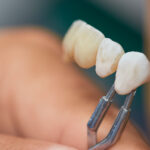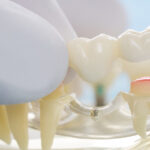Our natural teeth are prone to decay, discoloration, and misalignment as we use them over time. Sadly, these changes in tooth appearance can hinder us from our perfect smile. Pros and cons of dental crowns may help you decide if they are an option to enhance the look of your teeth, especially if you feel that other dental procedures appear too extreme for these issues.
Pros and Cons of Dental Crowns
Dental crowns can improve your oral aesthetics as they cover the cracks, decay, and discoloration while also improving teeth alignment. They are also used to restore dental implants and can even replace a natural tooth. In this article we will discuss further the advantages and disadvantages of dental crowns.
Advantages of Dental Crowns
Dental crowns are usually built with hard materials such as porcelain or ceramic which can be designed according to the shape, size, and color of your natural teeth. When they are taken care of, dental crowns can last between 10 to 30 years. And for the duration of those years, you can enjoy the following benefits that dental crowns can offer:
-
Protect a weak or broken tooth
A weak tooth is easy to chip or break, and we feel a stabbing pain every time we have to use a broken tooth. Dental crowns can cover these damages and hold multiple cracked teeth together, thus restoring the fractured teeth’s function.
-
Cover and strengthen a dental implant
Dental crowns can not only be used for natural teeth, they can also be used in covering and strengthening dental implants. The process begins with fusing a screw into the gum line, which would take a few days to recover. The dental crown can then be attached to the screw once the healing is done.
-
Hold a dental bridge
Dental bridges are an option worth exploring if a patient decides not to go for a dental implant. For a dental bridge to have a firm hold, dental crowns can be placed on the surrounding teeth that will be cemented to the bridge. This process also gives the dental bridge a more natural look and feel.
-
Replace large or worn-out fillings
Instead of having another only, a patient with a tooth that has been filled several times may want to consider dental crowns for their next procedure. More durable than fillings, a dental crown can also work as a barrier to prevent harmful bacteria and acid from coming into contact with the tooth.
-
Improve the appearance of your discolored or misaligned teeth
Dental crowns can enhance the teeth’s appearance as discoloration and misalignment are among the most common concern why many patients go for this procedure. Ceramic or porcelain crowns can match the color and texture of the patient’s natural teeth for a more aesthetically-pleasing look.
-
Fix the size and shape issues
Dental crowns are a possible option to fix the size and shape issues of your teeth. After making the dental impressions via x-rays, a dentist can create dental crowns with appropriate dimensions that match your profile.
-
Protect teeth after a root canal
Installing dental crowns after a root canal treatment is often advisable. Dental crowns will support the root canal-treated teeth, prolong the survival of the natural roots in their bony sockets, and improve the function of teeth during chewing or biting food.
Disadvantages of Dental Crowns
Of course, there are a few disadvantages of dental crown treatment. The affected teeth will have to be permanently filed into the right shape and size before installing the crowns. Nerve damage is possible if the teeth are filed too thin.
Dental crowns, although the materials used are durable, can still be chipped – especially those made of porcelain. Tiny cracks can still be repaired, but restoration or replacement may be a much wiser option if a crown has multiple chips and breaks.
Dental crowns may become loose and fall out, or even be prone to bacteria growth once the cement used washes away. This results in tooth decay. Some patients may also develop an allergic reaction depending on the dental crown materials.
Tooth sensitivity to hot and cold temperatures also becomes a problem among many patients. However, root canal therapies can help mitigate this issue for hypersensitive teeth.
Are they right for you?
Your dentist will advise you to explore dental crowns as an option if your teeth are too damaged, decayed, or fractured to support a filling. Once the damaged portion is removed, your dentist will finally put the crown in place. From there, you can enjoy the benefits of the dental crown procedure that was previously mentioned while keeping in mind its disadvantages. These are normal for any procedure.
Our dentists have often been asked about the difference between dental crowns and veneers – and we would be happy to discuss the latter in our next blog.
Madison Dentistry & Implant Center offers dental crown treatment for our patients. Book a consultation with us today if you would like to know more about the procedure.




